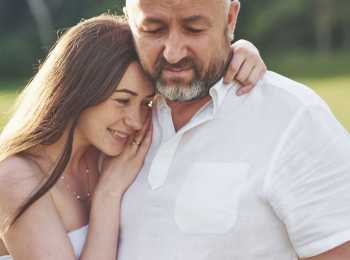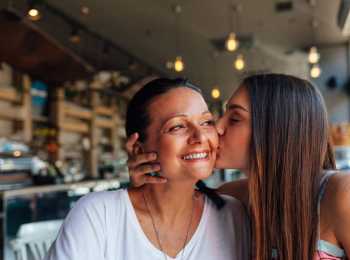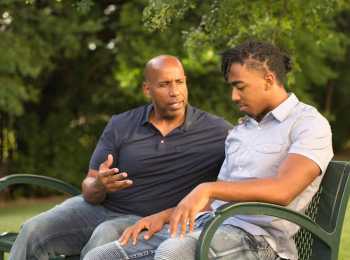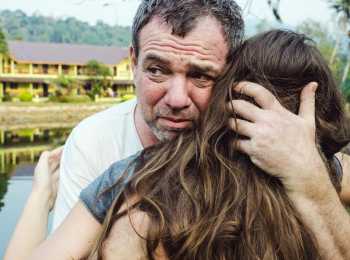Cancer is a disease. And most of the treatments for it make people feel and look much sicker before they (hopefully) start to get better.
On top of dealing with the physical effects of the cancer and treatment side effects, your mum or dad may be riding an emotional roller coaster as they go through their cancer ‘journey’.
The best support you can give your mum or dad is just to be there – listen when they want to talk, help around the house before they have to ask, help out with shopping, whatever they need.
Your mum or dad is likely to become sick and tired while undergoing their treatment and will not be able to cope with much other than trying to fight the cancer. While you might feel unqualified to help them, there are some things you should know so you can help them stay healthy and cope with the physical and emotional impact of the treatment.
What they might be feeling
While it’s hard to imagine what your mum or dad might be thinking and feeling about having cancer, they are probably feeling many of the same things you are. They may also be trying to protect you and hide at least some of them from you.
- Sad or depressed. Your mum or dad may not be able to do the things they used to do and they will miss these activities. Just as your friends may not know what to say to you, your parent may have the same issue with their friends. Depression (more than just feeling down) is fairly common for people diagnosed with cancer. If you think your mum or dad could be depressed, mention it to someone in their treatment team or talk to a Canteen counsellor, who can tell you about services that can help them.
- Scared. Your parent may be afraid of how their cancer will change their life as well as the lives of the rest of the members of your family. They may be scared the treatment will hurt or make them sick, or may even be frightened that they will die.
- Anxious. There are lots of things that could cause your parent to worry; how they are going to go to work or pay bills, how the treatment will affect them and how they will look. And of course they are probably worried about how you’re doing. Stress and worry is pretty normal in these circumstances, but if it goes on for too long or stops your mum or dad from doing what they need to do, it might be (clinical) anxiety. If you are concerned for your mum or dad talk to someone in their treatment team or a Canteen counsellor.
- Angry. A lot of people diagnosed with cancer feel angry and that it’s unfair. Your parent’s anger can sometimes come from feelings that are hard to express like frustration and fear. If your mum or dad is angry more than usual they are most likely angry at the cancer and not at you.
- Lonely. Having cancer can be a lonely experience and your mum or dad may feel a bit isolated. They may find that their friends have a hard time dealing with their cancer and don’t visit or they may be too sick to do things that they used to do. They may also feel that no one understands what they are going through and that they need to hide their feelings.
Side effects
As well as trying to getting rid of the cancer, many cancer treatments have unintended effects on the patient called ‘side effects’.
Unfortunately, many of these can be very uncomfortable and hard to deal with. Some of the most common ones are hair loss, weight loss or gain, vomiting and nausea, constipation or diarrhoea, sore mouth and swallowing problems, tiredness, poor concentration and memory (‘chemo brain’) and moodiness.
What side effects your parent gets or how severe they are has nothing to do with whether the treatment is working. They can be pretty minor, or they can be severe and have a big impact on how your mum or dad copes with the treatment physically and emotionally.
Helping your Mum or Dad cope with side effects
There are some pretty simple things you can do to help your mum or dad that don’t require any medical knowledge! Many people feel sick and/or tired as a side effect of their treatment. As well as physical effects like hair loss, weight loss or gain, sore mouth and swallowing problems, the emotional impact of having cancer treatment is huge.
Some of the things you can do that will help them cope include:
- Doing things they might usually do – like cleaning, washing, the grocery shopping – so they can focus their energy on things that are most important to them.
- Ask their doctor, nurse or someone in their treatment team about things you should do or not do at home to reduce their nausea/vomiting, or constipation, or diarrhoea.
- Help them keep their strength up and avoid infections. (Read the tips below.)
- Find out where to get a good wig or beanie if your mum or dad is self-conscious about their bald head.
- Remind them how much you care. Buy some flowers or leave a note. Or if you don’t live nearby, send a card or email.
- Help protect them from nosy neighbours, telemarketers, ‘drop in’ visitors. If you’re around you can answer the door or phone calls and let people know your mum or dad is okay but needs to rest.
Help them stay healthy
Even though cancer treatment may make your mum or dad feel quite sick, helping them to stay as healthy as possible will help their body recover and might reduce the side effects. Help them to eat well and keep their energy up by preparing good meals and snacks (including food they can take to the hospital). Read our tips about cooking in our coping at home section.
When your parent is being treated for cancer they can get infections more easily. An infection could make your mum or dad sicker, so they may need to stay away from crowded places or people who have an illness that they could catch.
You can help by:
- Washing your hands regularly to avoid spreading germs.
- Letting your parent know if you’ve been in contact with someone who is sick or has a cold.
- Not coming in close contact with your parent if you get sick (this is another good reason for taking care of yourself).
Your parent may be really sick while they are being treated and sometimes it is hard to know what is a normal reaction to the treatment and when you should seek help. Your mum or dad may also get sick and/or be really tired after treatment and you might be worried about that as well. To help you work out when to worry and when not to, here is a list of questions to ask their doctor or nurse.
- When do I worry about a temperature?
- How much vomiting is too much?
- Should I worry if they are a bit sleepy or vague – more than normal?
- What about going to the bathroom a lot?
- What if I notice blood on a towel, in the toilet or in their bed?
- Is it a problem if they get a cut anywhere?
- What if I notice bruises?
Keep the answers somewhere you can find it easily if you need to, along with telephone numbers for your parent’s doctor or hospital. If you are really concerned, you can always call 000 for advice and access to the paramedics.
Will my Mum or Dad die from cancer?
The good news is that many people survive cancer. Every day there are new discoveries and more effective ways of treating cancer, meaning more and more people are surviving. But of course some people do die from it.
There are many factors that affect what the outcome will be for your mum or dad including what type of cancer they have, where it is, how advanced the cancer is and how they respond to the treatment.
Understanding ‘survival rates’ and ‘prognosis’
Don’t freak out if you read somewhere that the survival rate for the type of cancer that your mum or dad has is low. Usually survival rates are overall rates – they are based on a large group of patients of all ages, with cancers at different stages. They also might have been calculated years ago, before newer treatments were introduced with better outcomes. Statistics can’t be used to definitively predict what is going to happen to an individual.
The likely outcome for your mum or dad is called their ‘prognosis’. No doctor in the world can give a definite prognosis – it’s only a best guess worked out by thinking about all the factors that affect your mum’s or dad’s situation and relating them to medical studies and results from other patients (who all have different factors affecting their outcomes!).
You may not want to know your mum’s or dad’s prognosis. If you do, ask them to be honest with you. Sometimes, hearing the news may be difficult. If you can, have a support person or the number for Canteen’s counselling service (1800 945 215) ready, so you can talk about it afterwards.
If your mum or dad is told that their cancer can’t be cured, this means that treatment has not worked or their cancer can’t be treated. This means they won’t get better and it is likely they will die from the cancer at some point. In our can't be cured section, you can find support services and view more helpful information on how to deal with a parent dying with cancer, or read our in depth guide on 'When your parent's cancer can't be cured', for tips and advice on dealing with this situation..


















